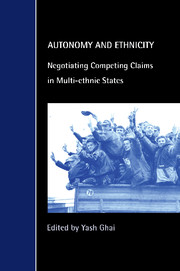Book contents
- Frontmatter
- Contents
- Acknowledgements
- List of Contributors
- 1 Ethnicity and Autonomy: A Framework for Analysis
- Part I Operating Autonomies
- 2 Federalism and Diversity in Canada
- 3 Federalism and Diversity in India
- 4 Autonomy Regimes in China: Coping with Ethnic and Economic Diversity
- 5 How the Centre Holds: Managing Claims for Regional and Ethnic Autonomy in a Democratic South Africa
- 6 Autonomous Communities and the Ethnic Settlement in Spain
- Part II Failed Autonomies
- Part III Seeking Autonomies
- List of Cases
- List of Legislation
- Index
3 - Federalism and Diversity in India
Published online by Cambridge University Press: 06 July 2010
- Frontmatter
- Contents
- Acknowledgements
- List of Contributors
- 1 Ethnicity and Autonomy: A Framework for Analysis
- Part I Operating Autonomies
- 2 Federalism and Diversity in Canada
- 3 Federalism and Diversity in India
- 4 Autonomy Regimes in China: Coping with Ethnic and Economic Diversity
- 5 How the Centre Holds: Managing Claims for Regional and Ethnic Autonomy in a Democratic South Africa
- 6 Autonomous Communities and the Ethnic Settlement in Spain
- Part II Failed Autonomies
- Part III Seeking Autonomies
- List of Cases
- List of Legislation
- Index
Summary
FROM DEMOCRACY AND PLURALISM TO CONFLICT MANAGEMENT
India is constituted by an extraordinary heterogeneity. Religion and language alone constitute a truly remarkable diversity. Hindi is the official language but only a little over a third of the population are Hindi speakers (Census of India 1988:x). Fifteen languages are recognised in the constitution, fourteen of them official languages of various states. In addition, there are hundreds of other linguistic communities spread throughout India. Similarly, Hindus, Muslims, Christians, Sikhs, Buddhists and adherents of a number of other smaller religions shape India's religious diversity. At one level, Hinduism may be seen as the religion of the majority; on the other, Hinduism is itself pluralised and fragmented by region, caste, and so on. In fact, the sheer proliferation of sects and local traditions are such that demographers find it impossible to track the internal diversity within different religious communities. Of course, religion and language are just two nodal points of ethnic identity and community; caste, tribe and region also constitute India's ethnic diversity.
Diversity is both India's most spectacular strength and its most formidable challenge. For the architects of the Indian constitution, federalism was a constitutional device that could engage this diversity in the project of nation building. It embodied and institutionalised those values that represented their own hopes and aspirations for independent India: democratic, pluralistic and politically stable. Federalist ideology can be situated in what Amartya Sen (1997:18–27) calls ‘classical nationalism’.
- Type
- Chapter
- Information
- Autonomy and EthnicityNegotiating Competing Claims in Multi-Ethnic States, pp. 53 - 76Publisher: Cambridge University PressPrint publication year: 2000
- 1
- Cited by

